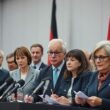The planned visit by German Foreign Minister Johann Wadephul to China, scheduled for this Sunday, has been abruptly cancelled. A spokesperson for the Foreign Ministry confirmed the news from Berlin on Friday, but officials have remained conspicuously silent regarding the impetus behind the decision. Despite repeated inquiries from the dts news agency, the Foreign Ministry declined to publicly state whether the cancellation originated from Beijing or Berlin, offering only a vague expression of regret that a face-to-face meeting would be postponed, citing the necessity to discuss “several topics.
The sudden postponement has fueled speculation concerning the increasingly strained relationship between Germany and China. The visit, intended to address a range of bilateral issues, was preceded by a sharp rebuke from Beijing directed at Wadephul’s statements concerning Taiwan. Chinese officials have accused the minister of tacitly endorsing “Taiwanese independence activities” with his call for maintaining the current status quo in the region, a position they interpret as a subtle rejection of Beijing’s ultimate goal of unification.
The incident underscores the precarious balancing act Germany faces in navigating its economic ties with China while simultaneously attempting to uphold its commitment to democratic principles and international law. Critics argue that the ministry’s reluctance to publicly attribute blame for the cancellation further obscures the complexities of this strategic challenge, suggesting a desire to avoid direct confrontation with Beijing. While Wadephul intends to hold intensive telephone discussions with his Chinese counterpart in the near future, the cancellation marks a significant setback for diplomatic efforts and raises questions about the viability of maintaining a pragmatic relationship with a nation displaying increasingly assertive foreign policy actions. The episode is likely to stoke debate within the German government concerning the appropriate level of engagement with China and the potential ramifications of diverging from a unified stance on issues like Taiwan.





